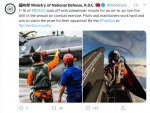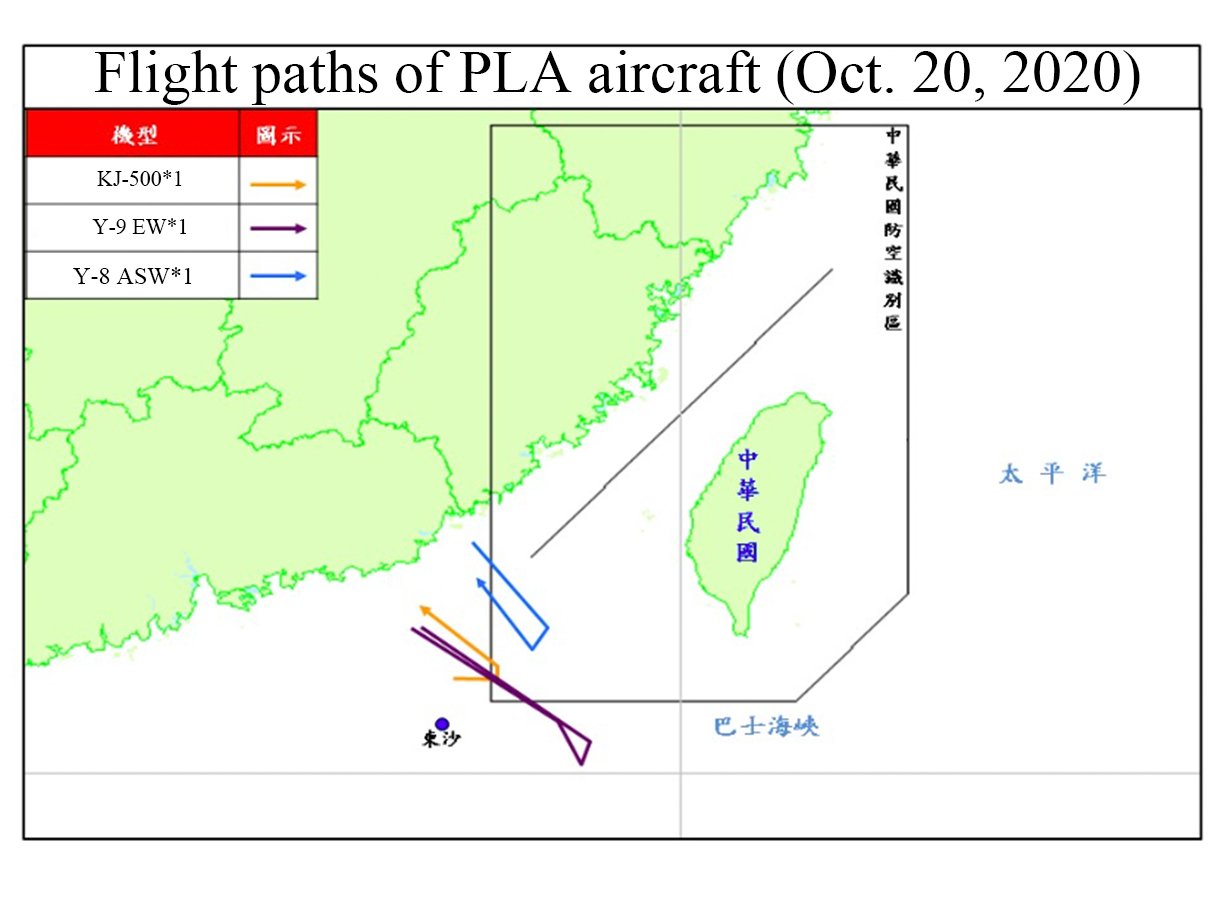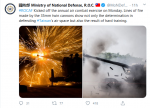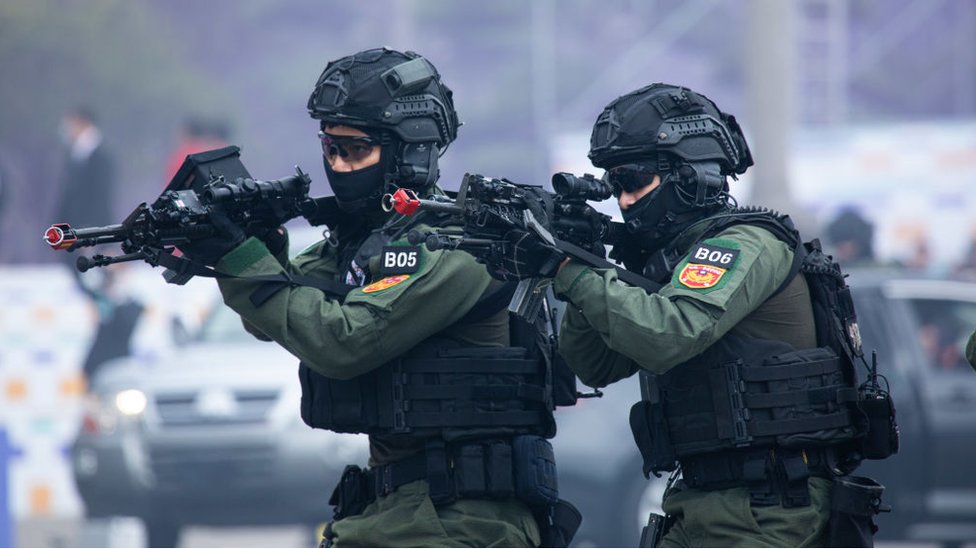continued
However, the Air Force's fleet of airliner-sized RC-135V/Ws are among some of the most
capable intelligence-gathering platforms in U.S. military service today, with large signals intelligence suites able to detect and geolocate various kinds of emitters, including radars and communications nodes.
With some two dozen intelligence analysts on board on a typical mission, these aircraft can intercept and begin to analyze enemy communications chatter and collect data on an opponent's “
Electronic Order of Battle," including integrated air defenses. You can read more about the Rivet Joints and their capabilities in this
past War Zone piece.
USAF
An overview of what the various members of a typical crew onboard an RC-135V/W during a mission do.
Keeping tabs on Chinese military activity on the coast of the mainland facing Taiwan is an important mission, broadly, for the United States, given its aforementioned commitments to Taipei. It's even more relevant at present given a slew of
threatening signals emanating
from the regime in Beijing, which routinely says it
could take military action should authorities in Taipei seek to formally break away from the mainland.
Just this past weekend, unconfirmed reports originating from
media outlets in Hong Kong said that the People's Liberation Army (PLA) was beefing up its ground-based missile forces near its southeastern coastline, including with the possible deployment of new hypersonic
DF-17 missiles.
Global Times, a newspaper operated by the Chinese Communist Party,
subsequently published a piece based on those initial reports and citing Chinese "experts" who claimed that these deployments were meant to thwart "foreign military intervention" if the PLA were to initiate a "re-unification-by-force" operation.
China Military
DF-17 missiles on parade in October 2019.
This follows months
of major PLA exercises, some of which appeared to simulate
potential operations against Taiwan, as well as
other provocative military activity, including sending aircraft
across the Median Line in the Taiwan Strait, which serves as the de facto boundary between the mainland and the island. There have been
competing U.S. military exercises, and
other military movements, some of which have
involved other American allies in the region, this year, as well.
This kind of tit-for-tat posturing has continued just in the past 24 hours with the announcement late yesterday that the U.S. government had approved a trio of potential arms sales to Taiwan. The three packages center on possible deliveries of
High Mobility Artillery Rocket Systems (HIMARS),
AGM-84H Standoff Land Attack Missile-Expanded Response (SLAM-ER) missiles, and
MS-110 podded reconnaissance systems for combat jets such as Taiwan's
F-16 Viper fighters. The deals, which Taiwan will still have to formally agree to and could be subject to change as part of subsequent negotiations, are valued at more than $1.8 billion, combined, and include a variety of ancillary equipment and services.
The AGM-84Hs, a derivative of the
Harpoon anti-ship missile, would offer Taiwan important additional capacity to engage threats across the Strait and elsewhere around the island in a crisis, while giving the launching aircraft the ability to stay further away from the PLA's integrated air defenses. The weapon, which despite its name can engage targets on land or at sea, is also
highly-accurate and resistant to electronic warfare jamming due to the use of an imaging infrared seeker to find its target in the terminal phase of flight.
USN
A SLAM-ER missile under the wing of a US Navy F/A-18C/D Hornet during a test.
The
MS-110s, which contain an advanced, long-range camera, will give Taiwanese combat jets important new reconnaissance capabilities, including potentially the ability to peer into the mainland to some degree from a standoff position using a slanted flight pattern. The
multi-spectral camera system in the MS-110 can collect visual and infrared imagery, as well as fuse them together for greater fidelity. In addition, this means the camera can grab images at night, as well as during the day, and detect objects of interest that might be obscured by smoke and dust, as well as some man-made camouflage.
Collins Aerospace
A graphic from an MS-110 brochure showing the pod on an F-16 Viper, as well as the camera itself in the inset.
However, the HIMARS package may be the most significant of the three. The system is capable of firing various munitions from the common
M142 launcher mounted on a 6x6 tactical truck, but the only ones that this proposed deal includes are 64
Army Tactical Missile System (ATAMCS) quasi-ballistic missiles with unitary high-explosive warheads. These missiles have a range of approximately 190 miles and would be easily able to reach coastal areas across the Strait, even from the center of the island. These weapons could be extremely valuable for engaging PLA artillery and ground-based missile systems, command and control nodes, supply dumps, as well as areas where invasion forces might be marshaling.
Of course, it's important to note that the PLA has a massive advantage in raw numbers, as well as various key systems, including
ground-launched ballistic and cruise missiles, over the Taiwanese military. The PLA's air and naval branches have also demonstrated their ability to launch strikes
from multiple directions at once, including from out in the Pacific
to the east, potentially enveloping the island. At the same time, Taiwan is well aware of these realities and has focused heavily
on developing and
acquiring various capabilities that could help delay a Chinese invasion to buy sufficient time for the U.S. military to stage an effective counter-intervention.
For their part, as expected, Chinese officials
have already denounced the new proposed arms sales to Taiwan. The deals "seriously damage China's sovereignty and security interests, send a seriously wrong signal to Taiwan independence forces, and severely damage China-U.S. relations and peace and stability in the Taiwan Strait," Chinese Foreign Ministry spokesperson Zhao Lijian said. "China will make a legitimate and necessary response according to how the situation develops."
U.S. President Donald Trump's administration has already incited the ire of Chinese authorities on multiple occasions in the past with the approval of other major arms deals for Taiwan, including the sale of
Block 70 F-16C/D Viper fighter jets, which Beijing had long said was
a "red line" issue. U.S. officials, including Trump himself, have cultivated a very close relationship with Taiwanese President Tsai Ing Wen who won reelection earlier this year and has pledged to further
distance the island's institutions from the mainland.
AP
Taiwanese President Tsai Ing Wen together with other Taiwanese officials ahead of her inauguration ceremony in May 2020.
There could well be a concern in Beijing that Trump, who is struggling in the polls for the 2020 U.S. Presidential Election, which will take place in a matter of weeks, might even just signal support for a greater independence push in Taiwan to bolster his domestic political position. The American President and his Administration have been highly critical of the Chinese government at times over the past four years, especially
over international trade issues, as well as other geopolitical concerns, such as territorial disputes in
the South China Sea. The ongoing
COVID-19 pandemic, which originated in China, has further soured relations between the two countries.
Tsai herself may have her own concerns about possible changes in the island's relationship with officials in Washington should Trump lose to his challenger, former Vice President and Senator Joe Biden, in November.
What does seem clear, is that American actions, such as sending the RC-135W over Taiwan and approving new arms sales to the island's government, will continue to draw ire and tit-for-tat responses from Chinese authorities.
Contact the author: joe@thedrive.com
please see the original story for additional pictures and video
posted for fair use
The United States has also just approved three arms deals for Taiwan, one of which includes short-range ballistic missiles that can hit the mainland.

www.thedrive.com










/cloudfront-ap-southeast-2.images.arcpublishing.com/nzme/3CYKUL7SYJ2VEAAN5CIR3Q6ZFU.jpg)
/cloudfront-ap-southeast-2.images.arcpublishing.com/nzme/BFFPBODLT35WD6KCT2NHJVMRDE.jpg)
/cloudfront-ap-southeast-2.images.arcpublishing.com/nzme/3CYKUL7SYJ2VEAAN5CIR3Q6ZFU.jpg)
















